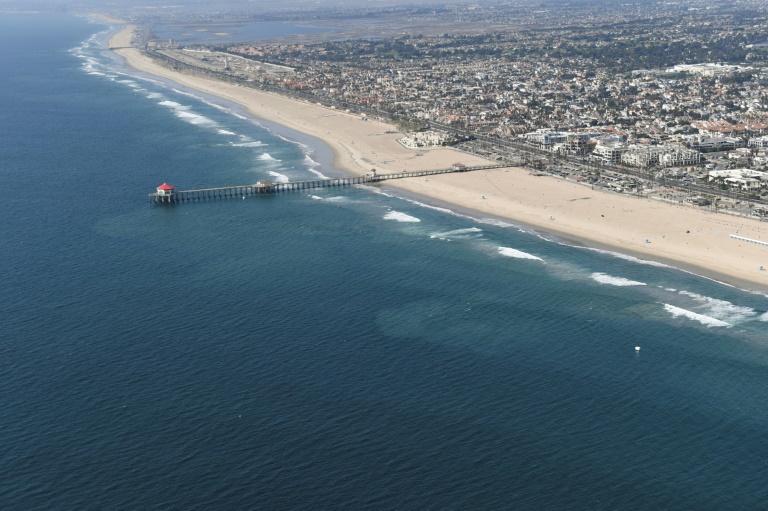Beaches normally thronged with the bronzed torsos of surfers are deserted as California races to clean up a huge oil spill.
Up to 131,000 gallons of crude could have leaked into the Pacific Ocean on the west coast of the United States when a pipeline ruptured at the weekend.
Authorities are investigating whether a ship’s anchor could have ripped open the pipe, dragging it more than 100 feet (30 meters) along the seafloor.
A 15-mile (24-kilometer) stretch of coast has been closed to the public — including some prime surfing spots that are usually packed with boarders.
“It’s weird to see no surfing out there for miles. It’s very strange,” said Shawna Sakal, manager of a surf store just yards from Huntington Beach pier.
“There’s always people surfing, they’re doing it year-round. The ocean is full of surfers, especially on the north and south side of the pier.”
Huntington Beach revolves around surfing. Equipment rental and sales stores jostle for space with surf schools.
But almost all of them are now shuttered.
For the tight-knit community of surfers, that’s tough.
“We have a bunch of friends that just surf, so sometimes we don’t even text each other,” said 18-year-old Jake McNerney. “We’ll just see each other out there.”
– Logjam –
More than 300 personnel are involved in the emergency response to the spill, which has been traced to a pipeline near Long Beach.
Dozens of container ships are anchored off the harbor there — one of the world’s busiest container ports — waiting for a berth in a pandemic-sparked shipping logjam.
The Los Angeles Times cited a federal investigator as saying a misplaced anchor from one of these ships was the most likely cause of the pipeline’s rupture.
Officials said almost 5,000 gallons of crude have been recovered so far, and more than a dozen birds covered in oil have been rescued.
Clean-up crews in protective gear could be seen on Newport Beach, further down the coastline, with weather patterns pushing oil south.
– School –
Powder blue skies and warm sunshine offered perfect beach weather on Wednesday, but stores and restaurants that rely on visitors were empty.
“Probably 50 percent of our business we probably lost so far,” said Sakal, whose father has been selling the surfboards he makes in their family-run store for five decades.
October is prime surfing time.
“It’s the best for surfers, and it’s best for people that live here. The weather’s really nice during this time,” said Sakal.
“It gets hot in the inland areas, so they all come to the beach on the weekends, but they can’t come to the beach now because of the oil spill.”
The disaster has also put a hole in the curriculum of one local school, where surf skills count as a credit towards graduation.
“We had just begun our competitive season the week before the spill,” says Lisa Battig of Fountain Valley School, located just minutes from the beach.
“All five teams also operate as classes and students receive PE (physical education) credit.
“We will be staying out of our local waters until we receive the all clear from the agencies.”
In the meantime, students will be practicing on land, she says, and traveling out of the area to surf at the weekend.
But they will be doing their part to help speed along the clean-up.
“When and if it is safe and reasonable, the students will also get involved with clean-up,” she said.









